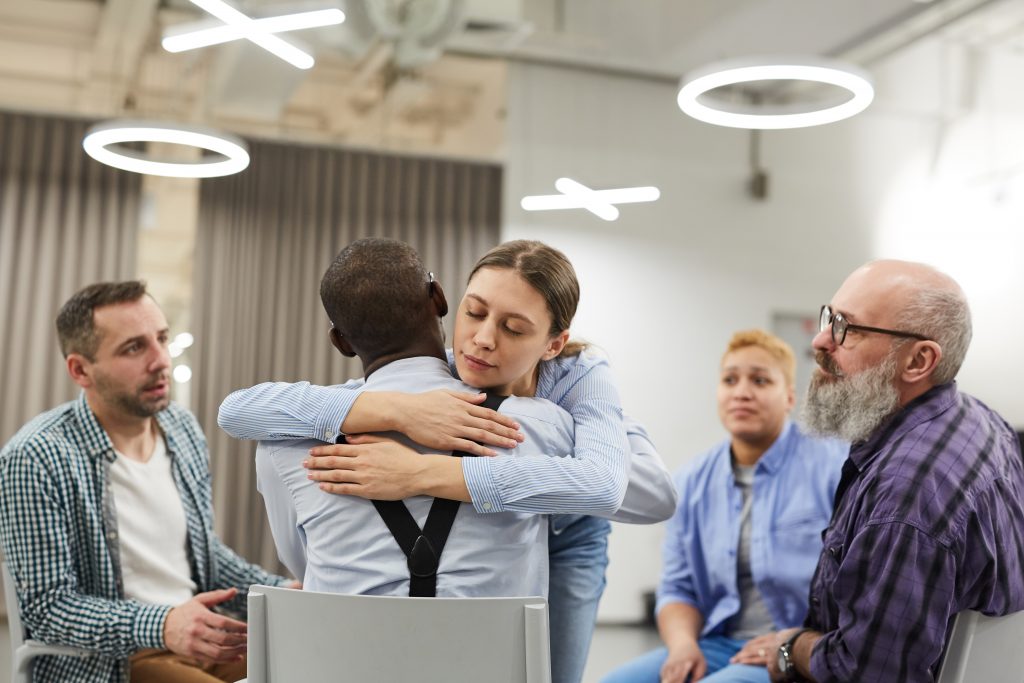Going through opioid addiction treatment is a relatively challenging process for both patients and their loved ones. In addition to the physical challenges, one has to overcome many mental and emotional challenges to complete their recovery.
That is the primary reason why a significant number of the patients choose to make opioid support groups as part of their recovery plan during and even after treatment.
The support groups serve an essential role in the recovery journey since patients can find strength and community support from people who fully understand their struggles.
If you have been contemplating joining an opioid support group but haven’t done so yet, you are in the right place.
This post discusses everything you need to know about opioid support groups, including their benefits. Read on to find out everything you need to know.
Understanding Opioid Support Groups
Before we dive deep into discussing the benefits of joining an opioid support group, it is good to help you understand what we are talking about and how it affects you or your loved one.
Generally, a support group is a gathering of individuals facing common issues to share ideas, opinions, and experiences. The primary purpose of a support group is to provide these people with an open platform to share their experiences, encourage, and comfort each other.
In the case of opioid support groups, the participants are people who have been affected by the opioid epidemic in one way or the other. These people have experienced first-hand what it feels to be addicted to opioids and are struggling to recover from the condition.

The best medicine can be the voice of people who have walked in your shoes and fully understand what you are experiencing.
An opioid support group offers patients a relatively safe platform where they can get information that is 100% practical, helpful, and constructive. Participants benefit greatly from the encouragement and learn more about coping with opioid addiction through shared experiences.
Hearing from other people facing the same problem as you will make you feel less alone in your fight against the addiction.
While it is perfectly normal to feel a little bit anxious and reluctant about joining a support group, having the right information can help dispel some of the common myths and misconceptions about these groups and how they operate.
What Type of Help Do Support Groups Offer?
If you are recovering from opioid addiction, it is critical that you leave behind your old friends, whose influence could lead to a relapse. This is the primary reason why a support group is a critical tool in your opioid recovery journey.
By joining one of the many opioid support groups, you surround yourself with people whose situation is similar to yours. Just like you, all of them are trying to get rid of the old associations that pushed them to addiction.
It means you and everyone in your support group can stick together and avoid elements that drove you to addiction. Your focus and the encouragement you receive from those in your support group will play a critical role in keeping you clean and sober.

If you attend the meetings of your support group regularly and keep close contact with your sponsor, you will soon realize that just as your previous associations would push you to engage in opioid addictive behaviors, members of your support group will now pressure you to stay sober and avoid any addictive behavior.
Your support group members will be the people that serve as your anchor whenever you feel like relapsing. Whenever you are faced with difficulties and tempted to return to your old addictive behaviors, feel free to reach out to your support group members or sponsor. These people will help talk you through the tough times.
Although you will most likely join a support group during rehab, it is an excellent resource to continue to use even after you leave rehab. By participating in the meetings, you can always maintain that positive influence if you feel like relapsing.
What Are the Other Benefits of Joining Opioid Support Groups?
As mentioned earlier, a support group provides you with a safe and secure platform to talk about the challenges you are facing in your recovery journey, emotions, and how you feel without being judged or criticized.
A good support group will also help you to:
1. Connect with Others
The truth is that humans are naturally social animals and will always long for connection. Many people struggling with opioid addiction usually struggle with feelings of isolation.
The feelings of isolation and loneliness can contribute to relapse, making recovery an impossible goal to achieve. This is one of the key reasons why opioid support groups are useful.
In these groups, you get to meet and connect with other people dealing with opioid addiction and even those who have walked the recovery journey to completion and achieved sobriety. You can form and grow bonds with such people drawing inspiration from their stories.
By joining a support group, you can easily overcome that feeling that nobody understands and cares for you. Support group members and sponsors will always be ready to listen to you and encourage you to soldier on with your recovery.
If you are dealing with an addicted loved one, the emotional toll you may be forced to deal with isn’t something to ignore. Opioid support groups for loved ones of those struggling with addiction provide you with a chance to voice your concerns and relate to others in a similar situation.
2. Grow through Shared Experiences
A good support group gives you endless opportunities to get things off your chest. Sharing your own experiences with other people in a similar situation as yours can help ease your emotional burden and feelings of isolation.
As others in the support group share their stories, you can gain valuable insights into how they dealt with certain situations you may be facing.
Your support group members will also offer you innovative ideas for how to care for yourself, combat fatigue, manage stress, and feel physically and mentally stronger.
3. Convenience
Some patients want to experience the emotional and mental benefits of opioid support groups without attending physical meetings. Or maybe they may be in a geographically remote area where there is no easy access to support groups.

In this case, online support groups come in handy. From phone support groups to online chat groups and message boards, there are relatively many options out there for individuals recovering from opioid addiction or those helping their loved ones recover.
Whether physical or online, you will still experience the conversation, acceptance, and love that exist with in-person support groups.
4. Safety
In many cultures across the world, any form of substance abuse is usually frowned upon or completely unacceptable. It means that finding a support group in such an area can be difficult.
Even if you manage to find one and join, attending in-person meetings could expose you to social ostracization, being disowned by family members and physical harassment.
In some parts of the world, alcohol is 100% illegal and even admitting to alcoholism can get you into huge trouble. People living in such areas and need help can join online support groups that guarantee safety and anonymity.
With an online support group, only a few people will know what you are engaged in and support you through the journey. You still get a chance to share experiences with different people from across the world and focus on your recovery journey.
5. A Sense of Accountability
Sometimes, staying on track with recovery can be a lot easier if you are in a circle of peers that hold each other accountable. Typically, when members join a support group, they pledge to attend all meetings and show up on time.
This commitment signifies that each of them is taking responsibility for their own actions and treating the entire recovery process seriously.

Members of a support group don’t only encourage. They also offer a sense of structure for one another and even confront you when they feel like you are veering off the track.
This isn’t meant to attack you but to help you understand that you are doing something wrong and you need to change to stay on track.
Is a Support Group Alone Enough for Opioid Addiction Recovery?
The simple answer is “no.” Even though opioid support groups play a critical role in your recovery journey, they are not a substitute for proper Suboxone treatment.
Support groups should only be used in addition to your primary treatment option. You can use your support group to reinforce the behaviors you learned at the treatment center to say on track.
The medical complications of withdrawal are one of the top reasons you can’t substitute proper treatment for a support group. Opioid withdrawal symptoms can be life-threatening, and you need to ensure that you detox safely.
A medical expert will assess your condition closely and determine the best treatment option for you. They will also help you detox safely and monitor your reaction to the treatment method in use.
So, other than support groups, you may also need psychiatric services, administration of different types of therapies, professional detox, and professional counseling.
Get the Support You Need on Your Opioid Addiction Recovery Journey
At CCIWA, we understand that every path to recovery looks different. That is why we have a team of experienced Suboxone doctors who will look beyond medication during your treatment.
They strive to ensure your mind and body is also healing by offering professional counseling, including group addiction counseling services. Our primary objective is to help you overcome your addiction and live a better life.
Contact us today to find a Suboxone clinic and doctor near you.



